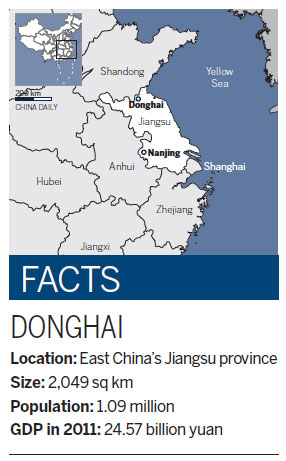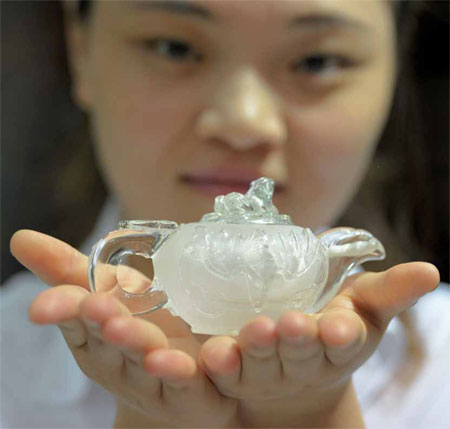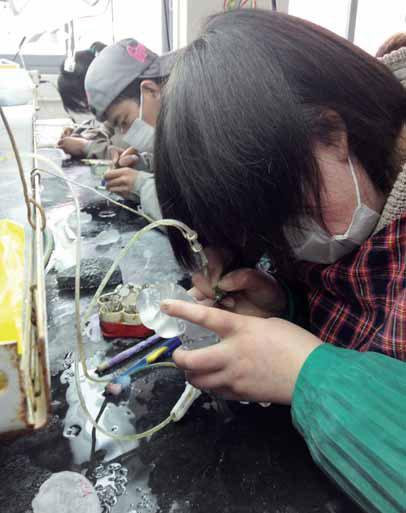Crystal clear
Updated: 2012-06-01 09:12
By Xiao Xiangyi (China Daily)
|
||||||||
|
A customer holds up a crystal teapot at a workshop in Donghai Crystal City. Zhang Kaihu / for China Daily |
|
A student works on a crystal Buddha in a crystal sculpture class at Donghai Technical School. Xiao Xiangyi / China Daily |

Soaring demand for luxury products opens up new vistas for natural crystal companies in Donghai
The glittering crystal coffin that contains the remains of Chairman Mao at Tian'anmen Square in Beijing has often been one of the major attractions for tourists during their China trip. But not many people know that the crystal coffin was also the trigger for the development of the natural crystal industry in Donghai, a county in East China's Jiangsu province. Crystal has often been associated with luxury and big-ticket global names like Swarovski, Waterford or Baccarat. With demand for luxury goods rocketing in China, a nation known for its gift-giving etiquette, natural crystal jewelry and craftwork are fast becoming the objects of desire for wealthy collectors. In Donghai, nearly one-fifth of its more than 1 million population are engaged in the natural crystal trade, be it the purchasing, manufacturing or sales of natural crystals.
|
Related readings: |
But the growth of the industry has had its share of problems. The main raw material, natural crystal, is not that readily available as there is a ban on crystal mining by private companies and individuals. In other words, Donghai is also the biggest importer of rock crystal from places as diverse as Brazil, Pakistan and Madagascar.
"China is now the world's second-largest luxury goods market and has always loved and understood quartz crystal much more than Westerners. When I traveled to big quartz producing countries like South America and Madagascar, I found that most of the key buyers were Asians, especially those from China," says Paloma Sanchez, a GIA-certified gemologist and jewelry designer.
Though natural crystal falls broadly under the gemstone category, its prices have been steadily going up. The price of gold rutilated quartz has risen from 2,000 yuan a kilogram in 2005 to more than 20,000 yuan a kilogram this year. Natural colored crystal like citrine (yellow) and amethyst (purple) are sold in carats and at prices of 300-500 yuan a carat, making them as expensive as rubies and sapphires, says Zhou Yi, general secretary of the Donghai Chamber of Commerce.
"Due to their natural quality and uniqueness, natural crystal is also an important collectible for connoisseurs and investors," says Liu Lin, general secretary of the World Jewelry Association.
Most of the natural crystals also have tremendous ornamental value after the mineral inclusions and color infusions by talented craftsmen. "Natural crystal is often the first choice for commercial, government gifts in China," he says.
Hailong Crystal Crafts Company set up in 1997 by Wu Zhaoe is one of the leading crystal makers in Donghai. Last year when US Secretary of State Hillary Clinton visited China, the All-China Women's Federation presented her a natural crystal necklace, designed by Wu.
The company has also produced several other crystal masterpieces. According to Wu, a crystal necklace similar to the one presented to Hillary Clinton fetched a price of more than 260,000 yuan at a recent charity auction.
The company also has several other celebrities who have purchased crystal masterpieces like Ni Ping, the well-known Chinese TV host.
"Crystal is sheer luxury. It is blasphemous to even think of it being sold like ordinary gemstones at an open fair. It should not be touted like the vegetables on sale in the evening markets," Wu says.
Since natural crystal and quartz are both in limited supply, the scarcity and rarity often decides the appreciation space, experts say.
"Natural crystal purchases often depend on the desire to have something unique. Many of the leading brands have special techniques to give the man-made crystal a magnificent hue. But it is nothing like the natural crystal, which has an organized atomic structure and an amorphous nature," Sanchez says.
Sun Rui, founder of Zhishanfang, another leading crystal firm in Donghai, says that brand building is not such an easy task for crystal makers as creation of the delicate and intricate crystal masterpieces is often a time-consuming process.
"In the last 20 years, no significant brand has emerged to challenge Swarovski. This could be due to the limited capacity and the low industrialized production techniques of crystal makers," Sun says.
"Many crystal art pieces cannot be copied and there are never two stones of the same kind. But if the industry needs to evolve further, we must consider mass production in the long run," Sun says.
By building up his own rating and rewarding system, Sun has been shaping his more than 180 employees into a professional team comprising designers, management talent and most significantly, hierarchical craftsmen, he says.
"The pyramid-like hierarchical craftsmen refer to three levels of craftsmen - those who can design, those who can teach and those who are skilled in sculpting techniques," Sun says.
"We have made considerable progress in artistic design and industrialized production," says Sun, adding that the current production capacity of Zhishanfang is about 100,000 crystal ornaments every year.
After capacity expansion, Zhishanfang sales rose to a record high of 18 million yuan last year.
Sun is not the only entrepreneur from Donghai who has realized that mechanization and industrialization hold the key for future growth. Others are fast following suit, but there are still some procedures like sculpting that cannot be mechanized, says Zhu Jingqiang, founder of Shilaiyunhao Crystal Craft Co.
"Skillful and creative handwork represents intelligence and added value. Without intelligence, the craftwork will tend to be a low-end product without any appeal," Zhu says.
Apart from expanding the capacity by mechanization, Zhu believes business models like chain stores will also help create more brand awareness among consumers.
Zhu has a network of more than 85 Shilaiyunhao stores in the eastern and coastal regions of China. On average, the company is adding 10 new stores every year, he says. After switching to the franchise model of expansion, Shilaiyunhao revenues rose to 80 million yuan last year from 68 million yuan in 2010.
Lack of skilled crystal craftsmen has been another problem that the industry has to contend with and some companies are looking to address this issue by offering crystal sculpture courses in local colleges like the Donghai Technical School.
"It is encouraging to see that there are many who are willing to stay on in Donghai and learn skills like crystal sculpting and cutting. To that extent, Donghai does not have an acute talent crunch as the youngsters can look forward to a hopeful and profitable future with the booming crystal industry," says Sun from Zhishanfang, who took the initiative to establish a school for crystal sculptors at the local college in 2009.
Known as China's "Crystal County", Donghai has 300 million tons of quartz and 300,000 tons of crystal reserves (with purity reaching 99.9 percent), which is the highest in the country.
Wu Zhaoe, considered one of the most skillful technicians in the Donghai mine, also participated in the selection of Mao's crystal coffin. The beautiful clarity of the natural crystal had long touched Wu until she decided to make an attempt to fashion and polish the odd crystal bits into beads for bracelets and necklaces.
Spurred by an idea of creating crystal ornaments, Wu dismantled her washing machine and fixed the little generator onto a wooden table. In 1991, Wu's invention became the first machine to process natural crystal.
The products developed by Wu found its way to friends in Nanjing, the capital of Jiangsu province, and soon natural crystal necklaces turned out to be one of the fastest selling fashion trinkets.
Wu's machine was like a pebble dropped into a pool and has caused an ever-widening circle of ripples. Soon many residents in Donghai began to imitate Wu by making their own machines and producing profitable crystal beads at home. To some extent, this was also the genesis of the natural crystal market in Donghai.
In spite of the strong demand from the domestic market, many local entrepreneurs are still pinning their hopes on overseas orders. Not surprisingly, demand has also been rising steadily in the international market.
Keizo Fujita, a big craftwork distributor from Tokyo, has recently signed a contract with Zhu Jingqiang to become the exclusive importer of natural crystal ornaments from Shilaiyunhao in Japan.
"The deal with Fujita will contribute at least 20 million yuan to our 2013 revenue," Zhu says.
"The demand for various types of crystals in small quantities is good for the domestic market. But international distributors usually give us bulk orders," Sun says.
Enterprises also have to be deeply rooted in their own brands with core competencies and a distinctive culture. Otherwise they often end up as big OEM factories for foreign companies, says Shan Jianghong, general manager of Songsheng Crystal Co.
"That is why we are focusing on crystal sculpture, one of the most difficult skills in rock crystal processing," says Shan. "Our products will be based on the sculpture themes from traditional Chinese culture and also Western classics. We will make minor adjustments for different markets," she says.
xiaoxiangyi@chinadaily.com.cn
(China Daily 06/01/2012 page12)

 Relief reaches isolated village
Relief reaches isolated village
 Rainfall poses new threats to quake-hit region
Rainfall poses new threats to quake-hit region
 Funerals begin for Boston bombing victims
Funerals begin for Boston bombing victims
 Quake takeaway from China's Air Force
Quake takeaway from China's Air Force
 Obama celebrates young inventors at science fair
Obama celebrates young inventors at science fair
 Earth Day marked around the world
Earth Day marked around the world
 Volunteer team helping students find sense of normalcy
Volunteer team helping students find sense of normalcy
 Ethnic groups quick to join rescue efforts
Ethnic groups quick to join rescue efforts
Most Viewed
Editor's Picks

|

|

|

|

|

|
Today's Top News
Chinese fleet drives out Japan's boats from Diaoyu
Health new priority for quake zone
Inspired by Guan, more Chinese pick up golf
Russia criticizes US reports on human rights
China, ROK criticize visits to shrine
Sino-US shared interests emphasized
China 'aims to share its dream with world'
Chinese president appoints 5 new ambassadors
US Weekly

|

|








